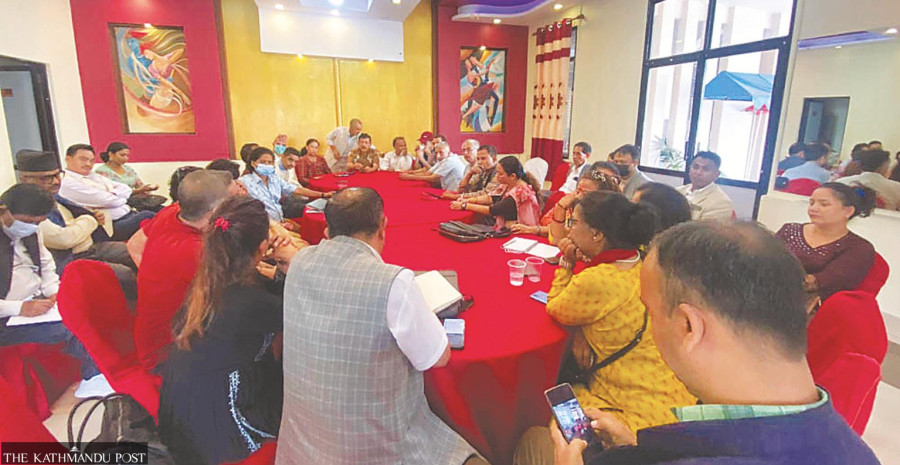Politics
In Congress, rival faction ups the ante seeking fair share of seats for its leaders
Amid seat-sharing talks among ruling coalition partners, Koirala camp leaders are concerned they might be left out.
Anil Giri
Hours after a meeting of the central work executing committee of the Nepali Congress entrusted party President Sher Bahadur Deuba with the task of nominating party candidates for the November 20 general and provincial elections, the rival camp led by Shekhar Koirala decided to seek 40 percent seats for its supporters.
The Koirala camp held a separate meeting on Saturday and concluded that since Deuba, since his election as the party president, has been taking almost all decisions unilaterally, there’s a need to call for a justifiable seat distribution.
There are 165 seats under the first-past-the-post (FPTP) system and 110 under the proportional representation (PR) system for the House of Representatives. For the seven provincial assemblies, there are 330 FPTP seats and 220 PR seats.
The Congress is already under pressure when it comes to seat-sharing as its coalition partners are demanding at least 80 seats under the FPTP category. The Congress has been eyeing at least 99 seats for itself while the remaining 66 would go among the coalition partners.
The five ruling parties have formed an 11-member task force to work out seat-sharing arrangements. But the task force has failed to form the modality.
Congress leaders say the leadership is set to come under more pressure with the rival camp upping the ante.
The Koirala camp is increasingly worried that its leaders could be left out as Deuba may agree to cede some more seats to the coalition partners for the fear that they could desert him.
“That’s why the rival camp has decided to demand at least 40 percent seats for them,” said Guru Raj Ghimire, a Congress leader.
The Congress is aiming for a majority, or close to majority seats, by contesting in 99–100 constituencies. If it can win 75–80 constituencies, the party stands a good chance to form a government even without the CPN (Maoist Centre).
The Maoist Centre, hence, is in a bid to stop the Congress from winning majority seats.
Arjun Narsingh KC, a senior Nepali Congress leader, said even 99–100 seats won’t be enough for the Congress.
“But we should not cede more seats to the coalition partners than 65–66,” KC told the Post. “Within the Congress also, seat-sharing is a big issue.”
At the Koirala camp’s meeting on Saturday, according to participants, some leaders expressed concerns that eligible and strong candidates of their camp might be barred from contesting the elections in the name of the alliance.
“We were of the view that we need to be careful and seek 40 percent seats for our camp from the establishment,” said Ghimire. “If the tickets are distributed in an unfair manner, we will go for a struggle. The party president is taking decisions unilaterally.”
Earlier in the morning, the central work executing committee was scheduled to discuss various issues including seat-sharing among coalition partners and between the two camps in the party.
But a decision to task the party president with selecting candidates was swiftly endorsed, according to leaders, much to the chagrin of the rival faction.
Multiple leaders said Deuba barely attends party meetings and decisions are being taken without taking into consideration the challenges the party faces.
Though the coalition partners have decided to stick with the Congress for elections, they are working on their own sub-alliance also, which Congress leaders say is a cause for concern and the party needs to maintain unity to fight various such challenges.
Coalition leaders say though the Congress has been saying it will contest in 99–100 constituencies, it will settle for 80.
On Saturday, while speaking at the party’s Standing Committee meeting, Maoist Centre chair Pushpa Kamal Dahal said that the Nepali will be convinced with 80 seats, letting the partners keep 85 seats.
Some leaders at the meeting suggested that in the last elections of 2017, the party had shared seats with the CPN-UML in the 40:60 ratio so this time too, the party should not agree to less than 40 percent seats, according to one standing committee member. That will mean 66 seats for the Maoist Centre alone and a huge reduction in the number of seats for the Congress.
According to some Congress leaders, if those deserving to contest are excluded, they are likely to contest as rebel candidates and won’t support candidates from the ruling coalition.
“In that situation, the CPN-UML may benefit,” said a Congress leader.
Some political analysts say the Congress is bracing for a large-scale discontentment if it has to compromise on 80 seats by leaving 85 for coalition partners.
Sri Krishna Aniruddh Gautam, a political analyst, said Deuba, however, doesn’t seem to be bothered as long as he gets the support of the Maoist Centre.
“After all, no one asked for his resignation when the party faced drubbing in the last elections,” said Gautam. “The same leaders and cadres have reelected Deuba as party president. So who will launch a mutiny?”
According to Gautam, leaving more seats for others would do more harm to the Congress than good.
“Local election results have increased the confidence of the Maoist Centre and the smaller parties. That’s why they have increased their bargaining power,” said Gautam. “Deuba is compelled to entertain the communists for the fear of a left alliance and any other possible political fallout.”




 13.12°C Kathmandu
13.12°C Kathmandu














